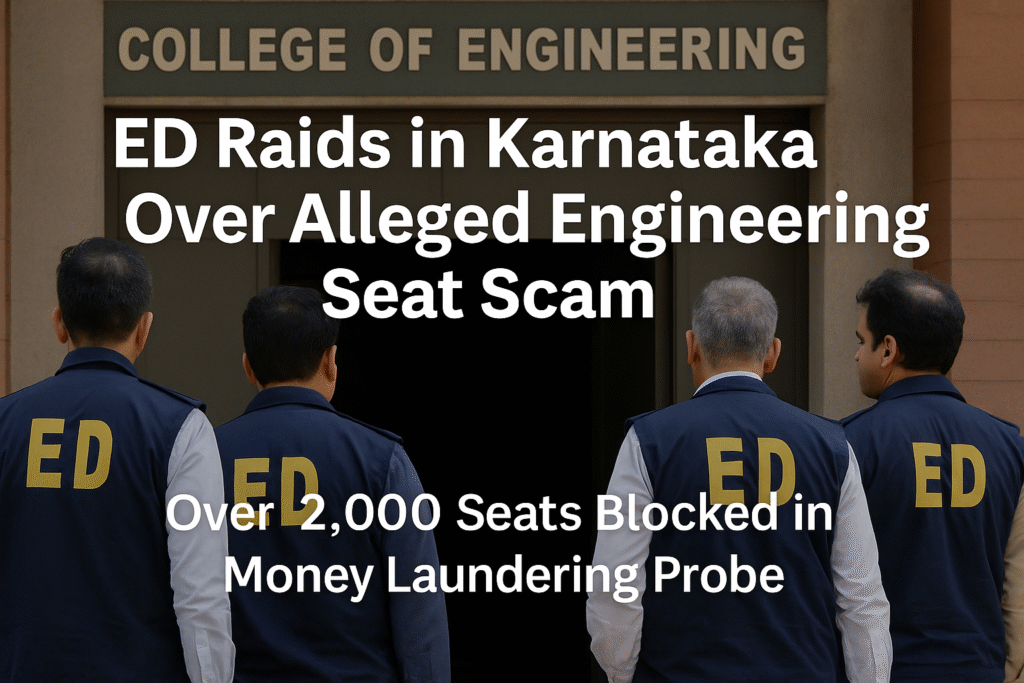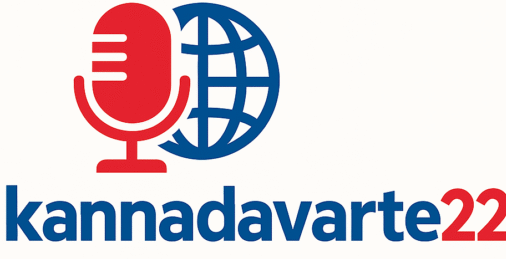Date: June 25, 2025
Location: Bengaluru & across Karnataka

Yesterday, in a striking move, the Enforcement Directorate (ED) executed coordinated raids at 18 locations predominantly in Bengaluru linked to private engineering colleges allegedly involved in a serious seat‑blocking scam during the 2024–25 admission season This high-stakes operation forms part of a broader money laundering investigation under the PMLA, responding to allegations of strategic seat obstruction and illicit monetary gains.
Allegations at a Glance
- Blocking over 2,000 seats: Private colleges, including BMS College of Engineering, Akash Institute of Engineering and Technology, and New Horizon College of Engineering, are accused of deliberately blocking seats after initial CET counseling only to “sell” them later as management quota seats
- Depriving deserving students: This tactic allegedly shut out many meritorious applicants, tilting the admissions process in favor of those who could pay hefty sums.
- Transition to ED: The case began with the Malleswaram police registering an FIR on November 14, 2024, and arresting 12 including a KEA contractual staffer and has now escalated to the ED following indications of significant financial fraud
Operation Scope: What ED Discovered
- Premises raided: Educational institutions as well as residences connected to college trustees and associated education consultants and agents were searched
- Funds trail: ED suspects the blocked seats generated substantial illegal revenue, triggering the money‑laundering investigation.
- Scale of the operation: 18 sites across Karnataka with a focus on Bengaluru were probed, targeting college campuses and individuals believed to be central to the scam
Role of Brokers & Colleges
Earlier CET‑related investigations revealed that brokers had utilized high‑ranked students’ credentials to block seats not just college management. As per a May 2025 chargesheet, nine brokers and one KEA-affiliated employee orchestrated the scheme, allegedly without direct college involvement These brokers utilized credentialed candidates, showing them in option entry phase but then withdrawing, resulting in seats appearing occupied but ultimately unfilled.
However, ED’s current investigations focus on whether college administrations colluded or merely allowed brokers to exploit loopholes. The raids aim to scrutinize financial transfers, internal communications, and institutional complicity.
Why This Matters
- Meritocracy undermined: Blocking seats disrupts a fair admission process, hurting genuine students committed to merit.
- Earning illicit gains: The conversion of unfilled seats into cash-rich management quotas exposes coaching and education businesses manipulating admission systems for profit.
- Precedent for probe: This marks one of the most extensive ED actions in India’s education sector, signaling intensified scrutiny of private institutions misusing autonomy.
Responses & Accountability
- Some brokers have claimed college authorities weren’t directly involved , but this claim remains contested pending forensic and financial evidence.
- The Karnataka Higher Education Minister, M.C. Sudhakar, criticized the slow pace of the police probe, noting that while brokers were arrested and bailed out, the focus on institutions was lacking
- KEA had issued notices to several colleges late last year, underscoring the issue’s urgency.
What Happens Next?
- Forensic audits: ED will analyze financial records, bank trails, email logs, and internal chats for incriminating evidence.
- College management scrutiny: Trustees and college leadership will be under a microscope if evidence reveals money flow or communications backing the scam.
- Legal fallout: Confirmed collusion could trigger criminal charges, financial penalties, and the reversal of admissions. Management quotas might be quashed and seats reallocated.
- Systemic reforms: The scandal may spur stricter regulations for private institutes and tighter control of reservation systems in CET-based admissions.
The ED’s raids expose a chilling dimension where the façade of educational autonomy masks lucrative malpractices. By allegedly blocking over 2,000 seats, private colleges not only violated the trust of countless aspirants but also spun what might have been a large-scale money-laundering racket.
As this investigation unfolds, the nation watches closely. Will the ED’s findings usher in justice for affected students? Can it catalyze a reform in how private educational institutions operate in India? Stay tuned.
read such more post like this on our page kannadavarte22.com
